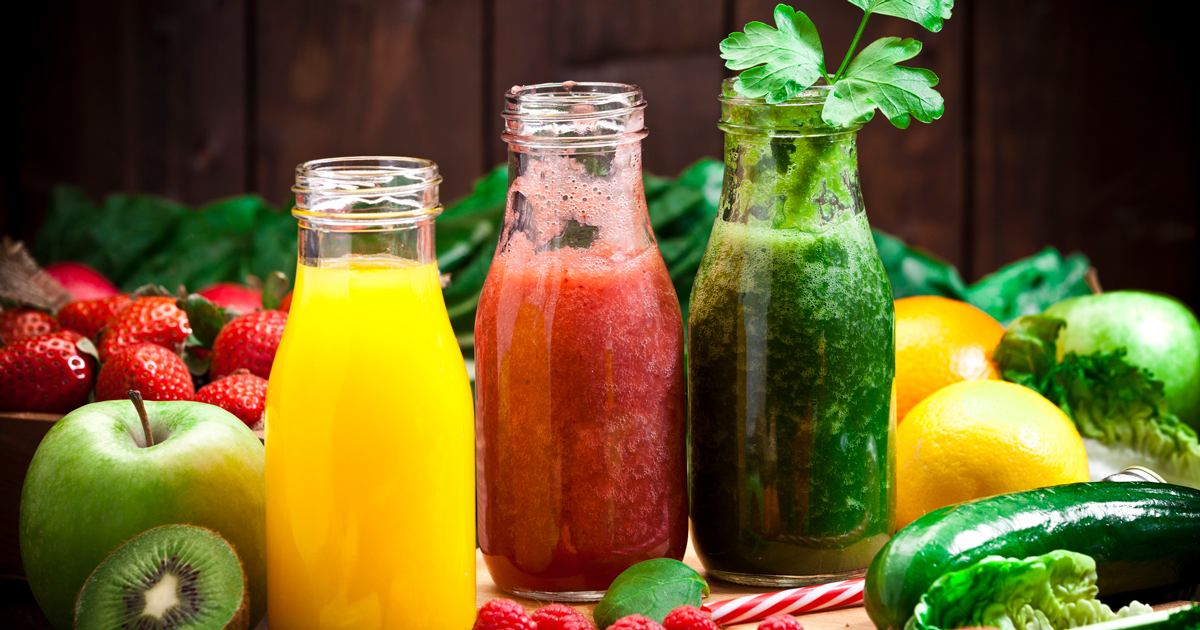Do juice cleanses provide extra health benefits?

This article provided by Chloe Hardin, graduate student in medical nutrition.
Fruits and vegetables contain important vitamins, minerals and fiber. But there's debate on whether eating produce whole or juicing them is the best way to go. Juicing separates the liquid contents of the fruit or vegetable from the fiber. It's time to debunk the myth that juicing is healthier.
Does juicing make nutrients easier to digest? No.
Your body can readily pull out the nutrients it needs from the juice or the whole fruit or vegetable. What you can miss out on from juicing is a great source of fiber. Fiber is an important part of a healthy diet that many adults lack. Juicing reduces the amount of fiber consumed, which is an important nutrient for healthy digestion.
Benefits of fiber:
- Normalizes bowel movements
- Lowers cholesterol
- Feels full longer
- Stabilizes blood sugar
Can juice cleanses clear out toxins? No.
There is no evidence that consuming only juices, or juice cleansing, provides health benefits or reduces cancer risk. Your kidneys and liver effectively remove toxins from your body. Juice cleanses will not improve this process or remove additional toxins. Scientific studies do not support the claim that juice cleansing can cleanse the body of toxins.
Does juicing affect the sugar concentration? Yes.
Juicing strips out fiber, which means you drink the fruit sugar, water and vitamins and minerals. Juicing also takes more fruits and vegetables to get a serving, so there would be more fruit sugar than just eating a serving of fruit. This can impact your blood sugar. Remember a serving of juice is 4 ounces or half a cup.
Without the fiber to make you feel full, it can be easy to drink a lot of liquid calories.
Think about how much calories, sugar and fiber are contained in a pound of produce. Those same calories and sugar remain in the juiced version – just without any fiber.
Average juice yields for 1 pound of produce:
- Apple: 8 to 10 ounces
- Grapes: 8 ounces
- Peaches: 1 to 3 ounces
- Pineapples: 4 to 6 ounces
- Strawberries: 4 to 5 ounces
- Carrots: 8 ounces
- Cucumbers: 4 to 6 ounces
- Spinach: 4 to 6 ounces
- Tomatoes: 8 to 10 ounces
The American Cancer Society recommends 2 ½ to 3 cups of vegetables and 1 ½ to 2 cups of fruit each day. If you like juices, you can drink them to increase your fruit and vegetable intake. Just be sure to check the calorie and sugar contents, looking for added sugars.
4 tips for healthier juicing
While we can all agree that fruits and vegetables are healthy, there's nothing magical about juicing. Juicing does not make nutrients easier to digest for your body. Juice cleanses also do not remove toxins from your body – your kidneys and liver do the job of detoxification for free.
- Eat whole fruits and vegetables for the added benefits fiber gives you. Juicing doesn't provide any more benefits than consuming whole fruits and vegetables.
- Check the labels of packaged juices. Choose 100% juice to limit your daily added sugar intake.
- If you juice fruits and vegetables yourself, wash the produce thoroughly to remove bacteria and prevent foodborne illnesses.
- Include good sources of fiber with your juices to help you feel more full and balance blood sugars.





